How To Write An Email Request (& get a positive response)


How do you write an email requesting something from an elite level performer/VIP in a way that will actually get a positive response?
The answer is surprisingly easy:
Shift your focus from a “me” perspective to a “you” perspective.
For example, years ago, I was hanging out with Charlie Hoehn, who’s worked with me and a lot of thought leaders like Tim Ferriss.
He told me how working behind the scenes has taught him how to work with these kinds of people.
Here's the secret:
“Everyone wants something from you guys,” he said. “Now I know how to stand out. Just don’t ask for anything! Actually, add some value first.”
This “you first” approach is how I’ve been able to get the advice of best-selling authors, superstar CEOs, and all kinds of fascinating people.
Let’s take a look a look at that in action.
Don't reinvent the wheel. Don't wonder what words to say. Know for sure using tested email scripts for your business and personal life.
Improving your social skills will always pay big dividends in the future. Not sure how to get started? Here's how you can step up your social game- in less than 30 minutes.
How to write an email asking for something
Here’s a request email I received from a reader a while back. I called him within 60 seconds of reading it. See if you can find out why:
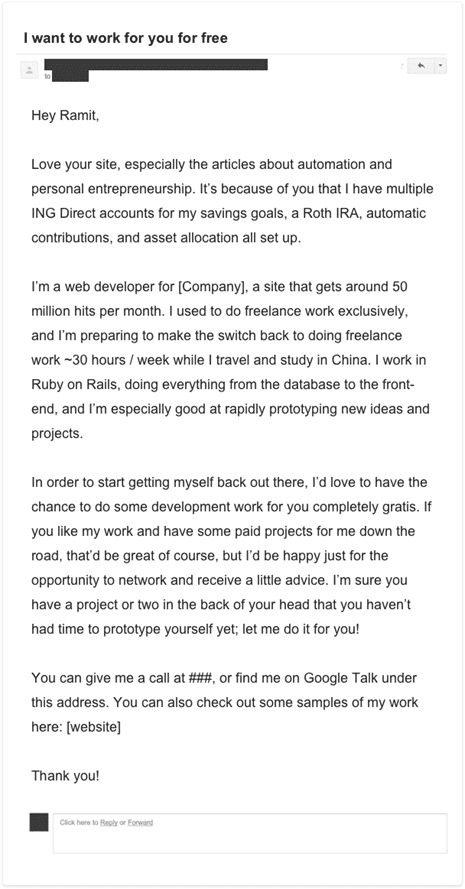
The reader was polite, considerate of my needs, and sold me on the benefits of working with him.
Let’s break down the anatomy of this email, though, so I can show you exactly why it works.
Step 1: Focus on the recipient
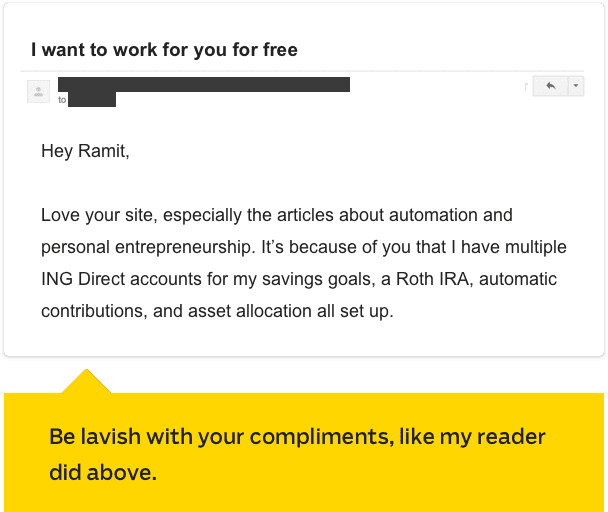
Remember: Your message to the important person should be focused on THEM. That’s the key to any polite email that hooks the reader in.
The reader above did this with a snappy and eye-catching subject line: I want to work for you for free.
YES. You have my attention.
He goes on lavishing me with compliments while sharing an example of how my advice has helped him.
What do you notice about that? It’s a genuine compliment. He’s not giving me superficial niceties like, “Your blog is cool” or “Awesome videos!”
He says he has multiple ING Direct accounts, a Roth IRA, and an automated finance system set up because of me. THAT’S how you write an email asking for something.
Use the first one to two sentences to compliment the person you’re emailing and their work. Tell them how long you’ve been following them, what their advice has done for you, and/or your favorite post by them.
This will hook them into reading the rest of your email.
Step 2: Sell your benefits
Let’s face it, you’re trying to sell yourself here.
What benefits can you offer them? Why should they care?
Sometimes this comes in the form of a warm contact (more on this later).
If you know of a mutual connection, you should name drop so the person you’re talking to knows how you know them. They’ll be much more willing to work with you if you both know the same person.
For this email, my reader knew that I was looking for talented developers — so he sold me on that.
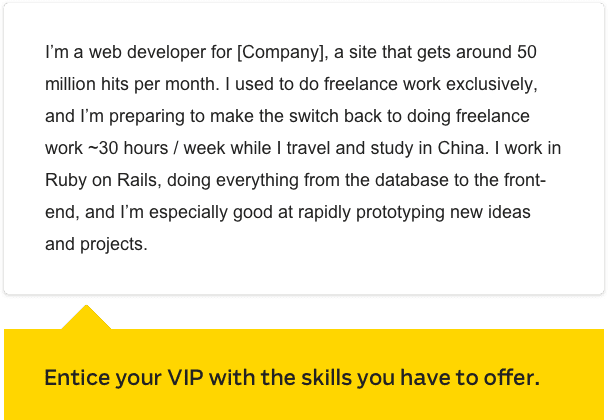
Guess what? That immediately set him apart from 99.999% of the crowd.
You’re going to have to do your homework if you want to leverage this technique. You need to know your VIP’s pain points and how YOU can solve them.
The world wants you to be vanilla...
…but you don’t have to take the same path as everyone else. How would it look if you designed a Rich Life on your own terms? Take our quiz and find out:
Go deep. Get inside of their heads. See what solutions you can offer to their biggest problems.
Be like Don Corleone.
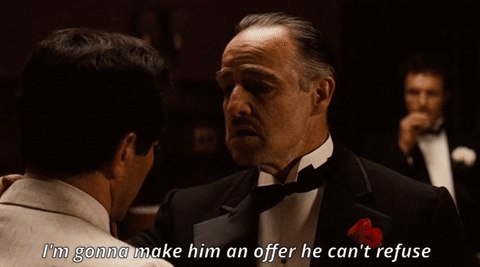
Notice that they’re ramping up their YouTube presence and you’re a video expert? Tell them that and do it for them.
Can you take their social media game to the next level? Sell them on all the followers and traffic you can generate for them.
If you can’t come up with a specific solution, show the person you’re emailing you have XYZ skill that’ll have ABC benefit for them.
Step 3: Make saying “no” impossible
Your last step is to anticipate any objections or concerns they might have.
My reader knew I had a few projects I wanted to get to but hadn’t made time for them yet.
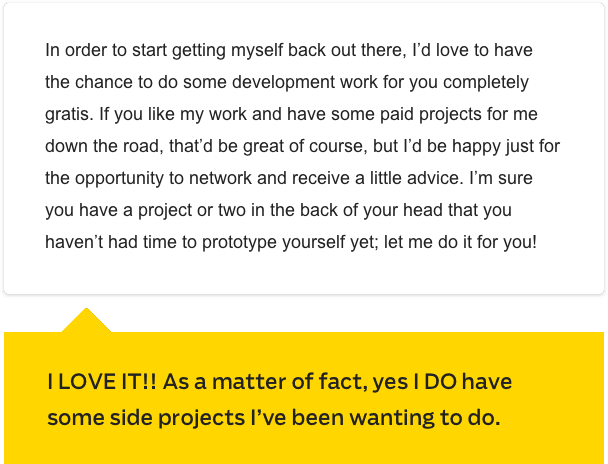
And while I could tell he really wanted paid work, he tells me that he’d “be happy just for the opportunity to network and receive a little advice.”
This made me saying no to him impossible!
He respected the power dynamic. After all, he reached out to me asking for my time.
And he showed this by being proactive, offering up his phone number, and also providing samples of his work from his website.
Also, acknowledge how many emails they get by ending your email with this script:
“I understand you have tremendous demands on your time, and if you don’t have time to respond, no problem. But if you do, even a sentence would mean a lot to me.”
This is the key to writing an email asking for something. It gives VIPs an easy out if they’re too busy. Counterintuitively, it also boosts your response rate since you’re showing empathy toward their time demands.
Remember, this email from the developer worked so well, I called him within 60 seconds of receiving his message.
Follow these steps, and you can see the same results.
I then encourage you to use the Closing the Loop Technique to follow up with your VIP two weeks after you get your response. You can use the following script:
“Hey, you told me ABC. I dug in. I discovered you were right, and so I took your advice and I just wanted to thank you. I’ll keep you updated a couple of months from now about how the new XYZ is going.”
ACTION STEP: Contact your VIP
- Brainstorm ONE busy VIP you’d love to contact, then shoot them an email.
- In the comments below, share your story and the response you got.
FAQs About How To Write An Email Requesting Something
How do you ask for something without sounding rude?
Instead of asking someone to do something, you can request that they consider helping you by saying, “I’d appreciate it if you could…” or “Thank you so much for…” or “Could you…?” Regardless of the extent of that person’s assistance in the past, it is always nice to be polite and show your gratitude.
What should I say in an email instead of please?
It is important to be nice and polite, but politeness can sometimes be overused. For example, the words “please” and “thank you” are polite, but they can become annoying if used too frequently. Other examples of polite words include “excuse me,” “I’m sorry,” and “goodbye.”
Why write an email to request something?
When writing an email to request something, it is important to be professional and courteous. There are several instances in which you might need to request something during your career, including for interviews with prospective employers, supervisors, and mentors as well as when seeking resources such as funding, additional research assistants, or equipment upgrades.